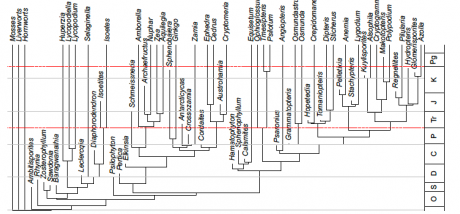The Foundation of Terrestrial life: Inferring plant evolution

Vascular plants form the foundation of Earth’s terrestrial ecosystems; understanding the timing and pattern of their origin and diversification thus underpins macroevolutionary study of all of terrestrial life. This project employs “total-evidence dating” (TED) methodologies for the simultaneous inference of the phylogenetic relationships of extant and extinct vascular plants, their divergence times, and their patterns of morphological evolution. We combine genomic data with morphological trait data from extant and extinct fossilized plants to generate a comprehensive view of land plant evolution over millions of years. Analyses are conducted using RevBayes which allows for the modular assembly of probabilistic models that use Markov chain Monte Carlo to perform inference. Our goal with the NECyberteam is to facilitate the transition from laptop to HPC in order to decrease run-times, increase efficiency, and further develop our tools, codes, and workflow on the VACC
